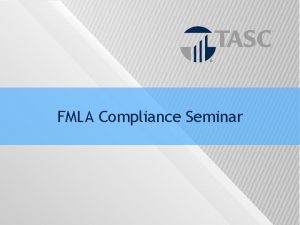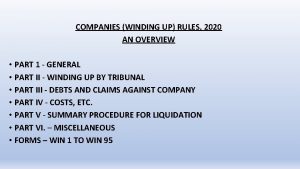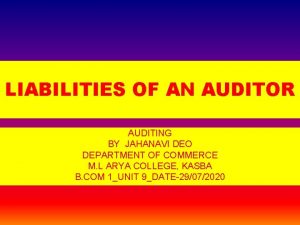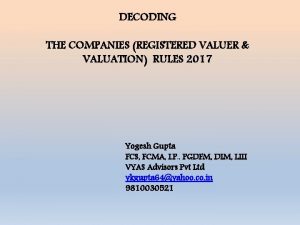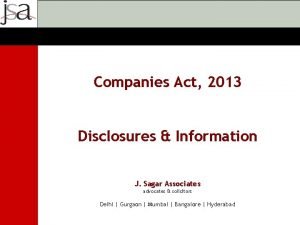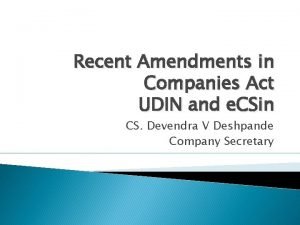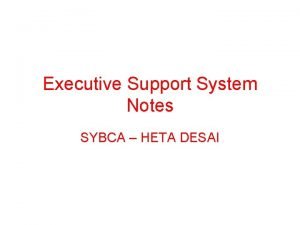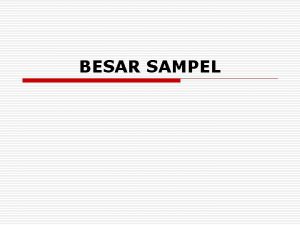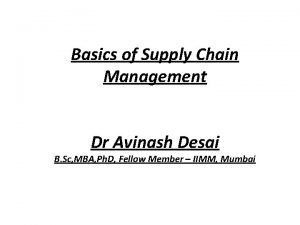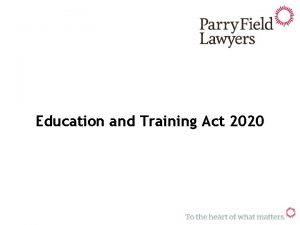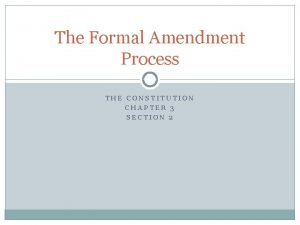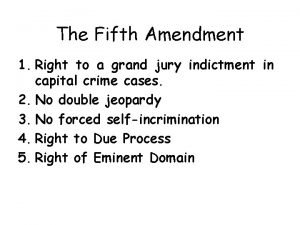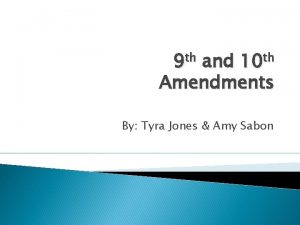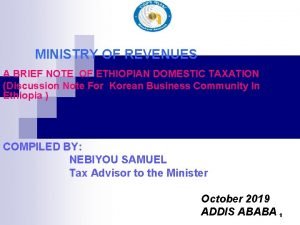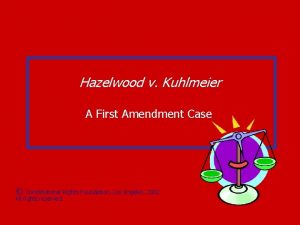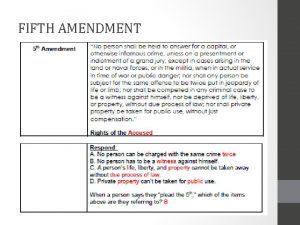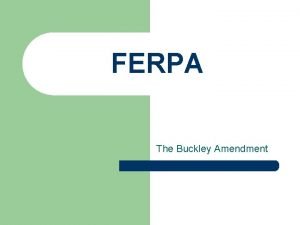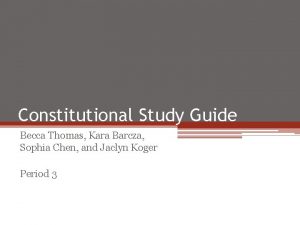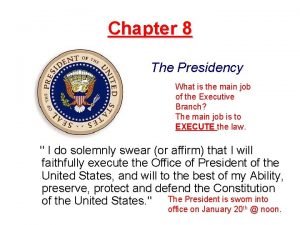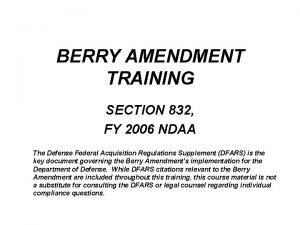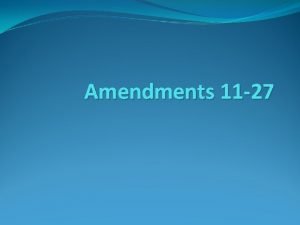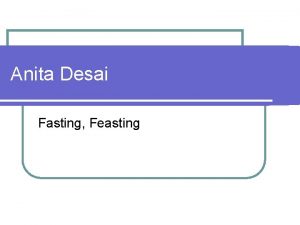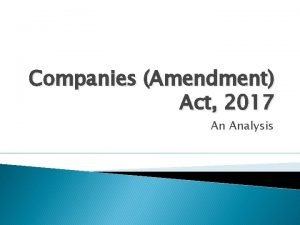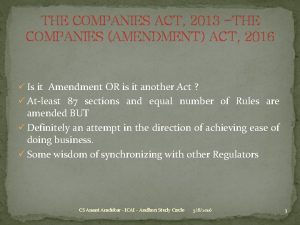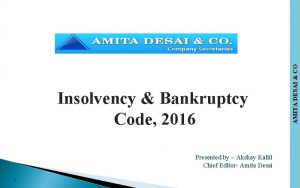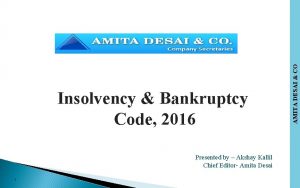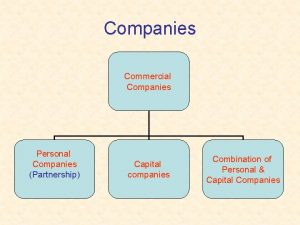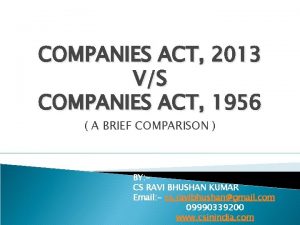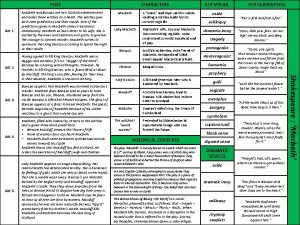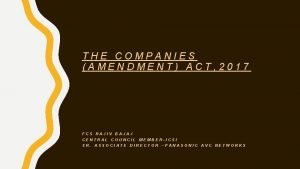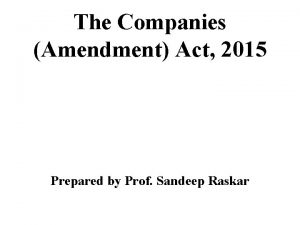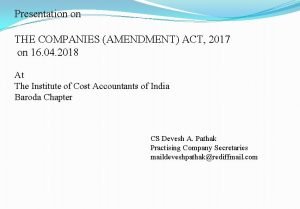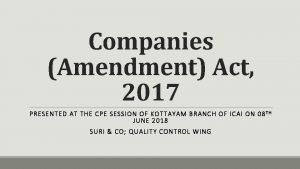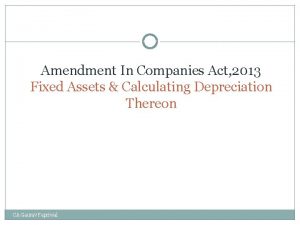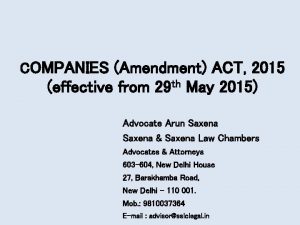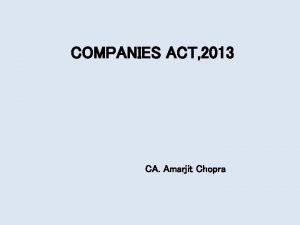The Companies Amendment Act 2020 Amita Desai Co





































































































- Slides: 101

The Companies Amendment Act, 2020 Amita Desai & Co. Company Secretaries, Mumbai Cell: 09820177691, Email: amita@amitadesai. com

Introduction ØThe Central Government in continuation of its efforts to facilitate greater “Ease of Living to law abiding corporates", had formed the Company Law Committee (CLC) on September 18, 2019 under the Chairmanship of Mr. Injeti Srinivas, then Secretary of Ministry of Corporate Affairs. ØCLC was comprising of representatives from the Ministry, Industry chambers, professional Institutes and the legal fraternity. ØCLC had submitted its report on November 14, 2019. ØTwo basic purpose of the CLC Report was: (1) Ease of Doing Business and (2)Ease of living of law abiding Corporate in the Country by decriminalization for minor, technical or procedural non-compliances.

Introduction Ø CLC took note of the progress made consequent to the Companies (Amendment) Act, 2019, which had resulted in de-criminalization of 16 minor procedural/technical lapses under the Companies Act, 2013 (CA, 2013) into ‘civil wrongs’, and adopted a principle-based approach to further remove ‘criminality’, in case of defaults which can be determined objectively and which, otherwise, lack the element of fraud or do not involve larger public interest. Ø CLC Report examined the scope of re-categorizing of further remaining compoundable offence into either penalty which can be handed through In-House Adjudication Mechanism (IAM) provided u/s 454 of the CA, 2013.

Journey of the Companies Amendment Act, 2020 Introduced in Lok Sabha on March 17, 2020 Passed by Lok Sabha on September 19, 2020 Passed by Rajya Sabha on September 22, 2020 Assent of President on September 28, 2020

74 Major amendments with notification of the Companies Amendment Act, 2020 27 offenses De-Criminalized Fine to Penalty with IAM 14 offenses where imprisonment is removed 8 offenses where penalty is reduced 5 offenses where punishment is removed

74 Major amendments with notification of the Companies Amendment Act, 2020 Other changes then Penalty/ Fine/ Punishments Producer Companies governance 12 sections where Central Government is empowered to specify / prescribe or notify certain exemption or provisions

Key changes in the Companies Amendment Act (CAA) 2020 • Decriminalization of Certain offence and put a cap on maximum amount of penalties in certain sections. Decriminalization is required as proving “mens rea” or knowledge on the part of the Company or its Officers is a subjective analysis that is often time consuming to prove. Fraudulent wrongs and the degree of public interest involved should determine criminal offence otherwise excessively high penalties or fines may be counter-productive towards incentivizing compliance • Empowered Central Government to exclude certain class of companies from the definition of “Listed Company” after consultation with SEBI and hence private limited companies whose Debt are listed are not required to comply with stringent compliances of listing • Permitted direct listing of securities of Indian Public Company in Foreign Jurisdiction • Empower Central Government to exempt certain Foreign Company/Company incorporated outside India whether it has place of business in India or not from the provisions of compliances under Chapter XXII of CA 2013

Key changes in the Companies Amendment Act (CAA) 2020 • Empower Central Government to mandate certain classes of unlisted Company also to file periodical Financial Results so to monitor their financial health where indirectly public money is involved due to borrowings or turnover by such unlisted companies • Empower Central Government u/s 16 of CA 2013 to allot a new name to any Company having similar name and issue fresh Certificate of Incorporation due to Rectification of Name of the Company • Empower Central Government to exempt class of persons from complying with regulation of Section 89 relating to beneficial interest in shares of the Company. • Allow lesser period than 15 days for mandatory keeping Letter of Offer open in Right Issue u/s 62 to enable to speed up such issues

Key changes in the Companies Amendment Act (CAA) 2020 • Empower Trial Court instead of Special Court u/s 435 with jurisdiction on the basis of place of offense for any wrongful withholding of property of a Company by its Officers or employees u/s 452 of the Act • Add new Chapter XXIA for the governance of Producer Company. • Permitting Non Executive / Independent Directors to receive remuneration from any company in addition to sitting fees, in case the company has no profit or inadequate profits. • Relax charging of higher additional fees u/s 403 for default on 2 or more occasions in submitting, filing, registering or recording any document, fact or information.

Key changes in the Companies Amendment Act (CAA) 2020 • Impose lesser penalties on Small Company, One Person Company (OPC), Producer Company and Start ups ( Section 446 B). • Exempt Non Banking Financial Companies (NBFC) and Housing Finance Company from filing certain resolutions u/s 117 with ROC for grant of loan, giving of guarantee or providing of securities as mentioned u/s 179 (3) (f). • To provide certain changes in Corporate Social Responsibility provisions like: • To exempt class of Companies whose spent on CSR of less than Rs. 50 Lakhs to form CSR Committee; • To carry forward excess amount spent on CSR to succeeding Financial Year; & • To provide higher penalty, if the Company fail to transfer funds to unspent CSR A/c or Fund specified in Schedule VII of the Act.

Key changes in the Companies Amendment Act (CAA) 2020 • To reduce penalty of Secretarial Auditor u/s 204 from Rs. 5 Lacs to Rs. 2 Lacs. • To reduce penalty of Registered Valuer u/s 247 to a maximum amount of Rs. 50, 000/- • To reduce liability of Company Liquidator u/s 284, 302, 348 and 356. • Provide for a window within which penalties shall not be levied for delay in filing annual returns and financial statements in certain cases. .

In 14 Sections Imprisonment is removed

1. 8(11)- Formation of Companies with Charitable Objects, etc. Provision under CA, 2013 Provision under CAA, 2020 Default in complying with the requirements relating to formation of companies with charitable objects, etc: Fine on Company: Minimum Rs. 10 Lakhs and Maximum Rs. 1 Crore The Directors and every Officer of the Company who is in default: Shall be punishable with imprisonment for a term which may extend to 3 years or with fine which shall not be less than Rs. 25000 which may extend to Rs. 25 Lakhs, or with both. Shall be punishable with fine which shall not be less than Rs. 25000 which may extend to Rs. 25 Lakhs. Provided that when it is proved that the affairs of the Company were conducted fraudulently, every Officer in default shall be liable for action under Section 447.

2. 26(9)-Matters to be Stated in Prospectus Provision under CA, 2013 Provision under CAA, 2020 If a prospectus is issued in contravention of the provisions of this Section, Fine on Company: Minimum: Rs. 50, 000 and Maximum: Rs. 3 Lakhs Every person who is knowingly a party to the issue of such prospectus: shall be punishable with imprisonment for a term which may extend to three years or with fine which shall not be less than Rs. 50, 000 but which may extend to Rs. 3 Lakhs or with both. Every person who is knowingly a party to the issue of such prospectus: shall be punishable with fine which shall not be less than Rs. 50, 000 but which may extend to Rs. 3 Lakhs.

3. Section 40 (5) - Securities to be Dealt with in Stock Exchanges Provision under CA, 2013 Provision under CAA, 2020 If a default is made in complying with the provisions of this Section, Fine on Company: Minimum: Rs. 5 Lakhs and Maximum: Rs. 50 Lakhs Every Officer of the Company who is in default shall be punishable : with imprisonment for a term which may extend to one year or with fine which shall not be less than Rs. 50, 000 but which may extend to Rs. 3 Lakhs, or with both. with fine which shall not be less than Rs. 50, 000 but which may extend to Rs. 3 Lakhs.

4. Section 68 (11) - Power of Company to Purchase its Own Securities Provision under CA, 2013 Provision under CAA, 2020 If a Company makes any default in complying with the provisions of this Section or any regulation made by SEBI, for the purposes of clause (f) of sub-Section (2): Fine on Company: Minimum: Rs. 1 Lakhs and Maximum: Rs. 3 Lakhs Every Officer of the Company who is in default shall be punishable : with imprisonment for a term which may extend to 3 years or with fine which shall not be less than Rs. 1 Lakhs but which may extend to Rs. 3 Lakhs, or with both. If a Company makes any default in complying with the provisions of this Section or any regulation made by SEBI, for the purposes of clause (f) of sub. Section (2): Fine on Company: Minimum: Rs. 1 Lakhs and Maximum: Rs. 3 Lakhs Every Officer of the Company who is in default shall be punishable : with fine which shall not be less than Rs. 1 Lakhs but which may extend to Rs. 3 Lakhs.

5. Section 128 (6) - Books of Account, etc. , to be kept by Company Provision under CA, 2013 Provision under CAA, 2020 If MD, WTD in charge of finance, CFO or any other person of a Company charged by the Board with the duty of complying with the provisions of this Section, contravenes such provisions, such MD, WTD in charge of finance, CFO or such other person of the Company shall be punishable with imprisonment for a term which may extend to 1 year or with fine which shall not be less than Rs. 50, 000 but which may extend to Rs. 5 Lakhs or with both. shall be punishable with fine which shall not be less than Rs. 50, 000 but which may extend to Rs. 5 Lakhs.

6. Section 147 (1) & (2)- Punishment for Contravention Provision under CA, 2013 Provision under CAA, 2020 If any of the provisions of Sections 139 to 146 (both inclusive) (Audit and Auditors) is contravened, Fine on Company: Minimum: Rs. 25, 000 and Maximum: Rs. 5 Lakhs Every Officer of the Company who is in default shall be punishable : with fine which shall not be less than Rs. 10, 000 but which may extend to Rs. 1 Lakhs. Fine on Company: Minimum: Rs. 25, 000 and Maximum: Rs. 5 Lakhs Every Officer of the Company who is in default shall be punishable : with imprisonment for a term which may extend to 1 year or with fine which shall not be less than Rs. 10, 000 but which may extend to Rs. 1 Lakhs, or with both. The reference of section 143 mentioned in section 147 has been omitted as punishment for default of section 143 is already provided in section 143 itself

7. Section 167 (2) - Vacation of Office of Director Provision under CA, 2013 Provision under CAA, 2020 If a person, functions as a Director even when he knows that the office of Director held by him has become vacant on account of any of the disqualifications specified in sub. Section (1), he shall be punishable with imprisonment for a term which may extend to 1 year or with fine which shall not be less than Rs. 1 Lakhs but which may extend to Rs. 5 Lakhs, or with both. he shall be punishable with fine which shall not be less than Rs. 1 Lakhs but which may extend to Rs. 5 Lakhs.

8. Section 178 (8) -Nomination and Remuneration Committee and Stakeholders Relationship Committee Provision under CA, 2013 Provision under CAA, 2020 In case of any contravention of the provisions of section 177 and 178, In case of any contravention of the provisions of sections 177 and 178, the Company shall be punishable with fine which shall not be less than Rs. 1 Lakh but which may extend to Rs. 5 Lakhs and every officer of the company who is in default shall be punishable with imprisonment for a term which may extend to 1 year or with fine which shall not be less than Rs. 25, 000 but which may extend to Rs. 1 Lakh, or with both The Company shall be liable to a penalty of Rs. 5, 000 and Every Officer of the Company who is in default shall be liable to a penalty of Rs. 1 Lakhs

9. Section 242 (8) - Powers of Tribunal Provision under CA, 2013 Provision under CAA, 2020 Contravention of the order of NCLT relating to alterations in MOA or AOA, Fine on the Company: Minimum: Rs. 1 Lakhs Maximum: Rs. 25 Lakhs and Every Officer of the Company who is in default shall be punishable with imprisonment for a term which may extend to 6 months or with fine which shall not be less than Rs. 25, 000 but which may extend to Rs. 1 Lakhs, or with both. Every Officer of the Company who is in default shall be punishable with fine which shall not be less than Rs. 25, 000 but which may extend to Rs. 1 Lakhs.

10. 243(2)-Consequence of Termination or Modification of Certain Agreements Provision under CA, 2013 Provision under CAA, 2020 Any person who knowingly acts as a MD or other Director or Manager of a Company in contravention of clause (b) of sub-Section (1) or sub-Section (1 A) of this Section, and every other Director of the Company who is knowingly a party to such contravention, shall be punishable with imprisonment for a term which may extend to 6 months or with fine which may extend to Rs. 5 Lakhs, or with both. Any person who knowingly acts as a MD or other Director or Manager of a Company in contravention of clause (b) of sub-Section (1) or sub-Section (1 A) of this section, and every other Director of the Company who is knowingly a party to such contravention, shall be punishable with fine which may extend to Rs. 5 Lakhs.

11. Section 284 (2)-No punishment of imprisonment for non- cooperation by Promoter and Director with Company Liquidator Provision under CA, 2013 Provision under CAA, 2020 Where any person, without reasonable cause, fails to discharge his obligations under sub-section (1), he shall be punishable with imprisonment which may extend to 6 months or with fine which may extend to Rs. 50, 000 or with both If any person required to assist or cooperate with the Company Liquidator under sub-section (1) does not assist or cooperate, the Company Liquidator may make an application to the Tribunal for necessary directions

12. Section 347 (4) - Disposal of Books and Papers of Company Provision under CA, 2013 Provision under CAA, 2020 If any person acts in contravention of any rule framed or an order made under sub-Section (3) of this Section, he shall be punishable with imprisonment for a term which may extend to 6 months or with fine which may extend to Rs. 50, 000, or with both. If any person acts in contravention of any rule framed or an order made under sub-Section (3) of this Section, he shall be punishable with fine which may extend to Rs. 50, 000.

13. Section 392 – Punishment for Contravention Provision under CA, 2013 Provision under CAA, 2020 If a Foreign Company contravenes the provisions of Chapter XXII relating to ‘Companies Incorporated outside India’, Fine on Foreign Company- Minimum: Rs. 1 Lakhs and Maximum Rs. 3 Lakhs and in the case of a continuing offence, an additional of maximum Rs. 50, 000 for every day after the first during which the contravention continues and Every Officer of the Foreign Company in default shall be punishable with imprisonment for a term which may extend to six months or with fine which shall not be less than Rs. 25, 000 but which may extend to Rs. 5 Lakhs, or with both. If a Foreign Company contravenes the provisions of Chapter XXII relating to ‘Companies Incorporated outside India’, Fine on Foreign Company- Minimum: Rs. 1 Lakhs and Maximum Rs. 3 Lakhs and in the case of a continuing offence, an additional of maximum Rs. 50, 000 for every day after the first during which the contravention continues and Every Officer of the Foreign Company in default shall be punishable with fine which shall not be less than Rs. 25, 000 but which may extend to Rs. 5 Lakhs.

14. Section 441(5) - Compounding of certain offences Provision under CA, 2013 Provision under CAA, 2020 Any Officer or other employee of the Company who fails to comply with any order made by the Tribunal or the Regional Director or any Officer authorized by the Central Government under sub. Section (4) shall be punishable with imprisonment for a term which may extend to 6 months, or with fine not exceeding Rs. 1 Lakhs, or with both. If any Officer or other employee of the Company who fails to comply with any order made by the Tribunal or the Regional Director or any Officer authorized by the Central Government under sub-Section (4) the maximum amount of fine for the offence to be compounded under this Section shall be twice the amount provided in the corresponding Section in which punishment for such offence is provided

In 5 Sections Punishment is removed

1. Section 16 (3)- Default in complying with the directions given by the Central Government for rectification of Name of Company Provision under CA, 2013 Provision under CAA, 2020 Default in complying with any direction of the Central Government for rectification of name of company Fine on Company: Maximum – Rs. 1, 000 for every day during which the default continues. Every officer of the company who is in default shall be punishable with Fine: Minimum- Rs. 5, 000; Maximum- Rs. 1 lakh Omitted

2. Section 48 (5) - Variation of Shareholders' Rights Provision under CA, 2013 Provision under CAA, 2020 Where any default is made in complying with the provisions of this Section, Fine on Company: Minimum: Rs. 25, 000 and Maximum: Rs. 5 Lakhs Every Officer of the Company who is in default shall be punishable : with imprisonment for a term which may extend to 6 months or with fine which shall not be less than Rs. 25, 000 but which may extend to Rs. 5 Lakhs, or with both. Omitted

3. Section 59 (5) - Rectification of Register of Members Provision under CA, 2013 Provision under CAA, 2020 If any default is made in complying with the order of the Tribunal under this Section, Fine on Company: Minimum: Rs. 1 Lakhs and Maximum: Rs. 5 Lakhs Every Officer of the Company who is in default shall be punishable : With imprisonment for a term which may extend to 1 year or with fine which shall not be less than Rs. 1 Lakhs but which may extend to Rs. 3 Lakhs, or with both. Omitted

4. Section 66 (11)-Default in compliance of the Order of Tribunal with respect to publication of Order approving Reduction of Share Capital Provision under CA, 2013 Provision under CAA, 2020 If a Company fails to publish the confirmation order of the reduction of share capital by the Tribunal, Company shall be punishable with fine which shall not be less than Rs. 5 Lakhs but which may extend to Rs. 25 Lakhs. Omitted

5. Section 71 (11) - Debentures Provision under CA, 2013 Provision under CAA, 2020 If any default is made in complying with the order of the Tribunal under this Section: Every Officer of the Company who is in default shall be punishable : With imprisonment for a term which may extend to 3 years or with fine which shall not be less than Rs. 2 Lakhs but which may extend to Rs. 5 Lakhs, or with both. Omitted

27 Sections alterations from Fine to Penalty In-House Adjudication (IAM) By the Regulator

1. Section 56(6)-Transfer and Transmission of Securities Provision under CA, 2013 Provision under CAA, 2020 Where any default is made in complying with the provisions of this section, Where any default is made in complying with the provisions of this Section, Company shall be punishable with: the Company and every Officer of the Company who is in defaults hall be liable to a penalty of Rs. 50, 000 Fine: Minimum- Rs. 25, 000 Maximum- Rs. 5 Lakhs. Every Officer of the Company who is in default shall be punishable with: Fine: Minimum- Rs. 10, 000 Maximum- Rs. 1 Lakhs.

2. Section 86(1)-Punishment for contravention Provision under CA, 2013 If any Company contravenes any provision of Chapter VI relating to Registration of Charges, Company shall be punishable with Fine: Minimum- Rs. 1 Lakhs and Maximum- Rs. 10 Lakhs. Every Officer of the Company who is in default shall be punishable with: Imprisonment: Maximum- 6 months OR Fine: Minimum- Rs. 25, 000 and Maximum- Rs. 1 Lakhs. OR Both. Provision under CAA, 2020 If any Company contravenes any provision of Chapter VI relating to Registration of Charges, Company shall be liable to a penalty of Rs. 5 Lakhs and Every Officer of the Company who is in default shall be liable to a penalty of Rs. 50, 000.

3. Section 88(5)-Register of members, etc. Provision under CA, 2013 If a Company does not maintain a register of members or debenture-holders or other security holders or fails to maintain them in accordance with the provisions of this section, The Company and Every Officer of the Company who is in default shall be punishable with Fine: Minimum: Rs. 50, 000; Maximum: Rs. 3 Lakhs and where the failure is a continuing one, with a further fine which may extend to Rs. 1, 000 for every day, after the first during which the failure continues. Provision under CAA, 2020 If a Company does not maintain a register of members or debenture-holders or other security holders or fails to maintain them in accordance with the provisions of this section, The Company shall be liable to a penalty of Rs. 3 Lakhs and every Officer of the Company who is in default shall be liable to a penalty of Rs. 50, 000.

4 & 5. Section 89(5)& (7)- Declaration in respect of beneficial interest in any share Provision under CA, 2013 Provision under CAA, 2020 89(5): If any person fails, to make a declaration as required under this section, Such person shall be punishable with fine which may extend to Rs. 50, 000 and where the failure is a continuing one, with a further fine which may extend to Rs. 1000 for every day after the first during which the failure continues. 89(7): If a Company, required to file a return under this section, fails to do so before the expiry of the time specified, The Company and every Officer of the Company who is in default shall be punishable with fine of minimum Rs. 500 and maximum Rs. 1000 and where the failure is a continuing one, with a further fine which may extend to Rs. 1000 for every day after the first during which the failure Continues 89(5): If any person fails, to make a declaration as required under this section, Such person shall be liable to a penalty of Rs. 50, 000 and in case of continuing failure, with a further penalty of Rs. 200 for each day after the first during which such failure continues, subject to a maximum of Rs. 5 Lakhs. 89(7): If a Company, required to file a return under this section, fails to do so before the expiry of the time specified, The Company and every Officer of the Company who is in default shall be liable to a penalty of Rs. 1000 for each day during which such failure continues, subject to a maximum of Rs. 5 Lakhs in the case of a Company and Rs. 2 Lakhs in case of an Officer who is in default

6. Section 90 (10 & (11)- Register of significant beneficial owners in a Company Provision under CA, 2013 Provision under CAA, 2020 90(10): If any person fails to make a declaration of SBO as required under this section, Such person shall be punishable with fine which shall not be less than Rs. 1 Lakhs but which may extend to Rs. 10 Lakhs and where the failure is a continuing one, with a further fine which may extend to Rs. 1000 for every day after the first during which the failure continues. 90(10): If any person fails to make a declaration of SBO as required under this section, Such person shall be liable to a penalty of Rs. 50, 000 and in case of continuing failure, with a further penalty of Rs. 1000 for each day after the first during which such failure continues, subject to a maximum of Rs. 2 Lakhs. 90(11): If a Company, required to maintain register or file the information or required to take necessary steps under this section, fails to do so or denies inspection as provided therein, The Company and every Officer of the Company who is in default shall be punishable with fine of minimum Rs. 10 Lakhs and maximum Rs. 50 Lakhs and where the failure is a continuing one, with a further fine which may extend to Rs. 1000 for every day after the first during which the failure continues 90(11): If a Company, required to maintain register or file the information or required to take necessary steps under this section, fails to do so or denies inspection as provided therein, The Company shall be liable to a penalty of Rs. 1 Lakhs and in case of continuing failure, with a further penalty of Rs. 500 for each day, after the first during which such failure continues, subject to a maximum of Rs. 5 Lakhs and every Officer of the Company who is in default shall be liable to a penalty of Rs. 25, 000 and in case of continuing failure, with further penalty of Rs. 200 for each day, after the first during which such failure continues, subject to a maximum of Rs. 1 Lakhs

7. Section 92(6)- Annual return Provision under CA, 2013 Provision under CAA, 2020 If a Company secretary in practice certifies the annual return otherwise than in conformity with the requirements of this section or the rules made thereunder, Such Company secretary in practice shall be punishable with Such Company secretary in practice shall be liable to a penalty of Rs. 2 Lakhs. Fine: Minimum: Rs. 50, 000 Maximum: Rs. 5 Lakhs.

8. Section 105(5)- Proxies Provision under CA, 2013 Provision under CAA, 2020 If for the purpose of any meeting of a Company, invitations to appoint as proxy a person or one of a number of persons specified in the invitations are issued at the Company’s expense to any member entitled to have a notice of the meeting sent to him and to vote thereat by proxy, Every Officer of the Company who knowingly issues the invitations or willfully authorizes or permits their issue shall be punishable with fine which may extend to Rs. 1 Lakhs. Every Officer of the Company who knowingly issues the invitations or willfully authorizes or permits their issue shall be punishable with liable to a penalty of Rs. 50, 000.

9. Section 124(7)- Unpaid Dividend Account Provision under CA, 2013 Provision under CAA, 2020 If a Company fails to comply with any of the requirements of this section, The Company shall be punishable with Fine: Company shall be liable to a penalty of Rs. 1 Lakhs and in case of continuing failure, with a further penalty of Rs. 500 for each day after the first during which such failure continues, subject to a maximum of Rs. 10 Lakhs and every Officer of the Company who is in default shall be liable to a penalty of Rs. 25, 000 and in case of continuing failure, with a further penalty of Rs. 100 for each day after the first during which such failure continues, subject to a maximum of Rs. 2 Lakhs. Minimum: Rs. 5 Lakhs Maximum: Rs. 25 Lakhs and Every Officer of the Company who is in default shall be punishable with Fine : Minimum: Rs. 1 Lakhs Maximum: Rs. 5 Lakhs.

10. Section 134(8)- Financial statement, Board’s report, etc Provision under CA, 2013 If a Company fails to comply with the provisions regarding signing of financial statement and contents & signing of Board’s Report, The Company shall be punishable with Fine: Minimum-Rs. 50, 000 Maximum-Rs. 25 Lakhs and Every Officer of the Company who is in default shall be punishable with Imprisonment: Maximum- 3 years or Fine: Minimum-Rs. 50, 000 Maximum- Rs. 5 Lakhs, OR with both. Provision under CAA, 2020 If a Company fails to comply with the provisions regarding signing of financial statement and contents & signing of Board’s Report, Company shall be liable to a penalty of Rs. 3 Lakhs and every Officer of the Company who is in default shall be liable to a penalty of Rs. 50, 000.

11. Section 135 (7) – Corporate Social Responsibility Provision under CA, 2013 Provision under CAA, 2020 If a Company contravenes the provisions of sub. Section (5) or sub-Section (6), If a Company is in default in complying with the provisions of sub-Section (5) or sub-Section (6), Fine on Company: the Company shall be liable to a penalty of twice the amount required to be transferred by the Company to the Fund specified in Schedule VII or the Unspent Corporate Social Responsibility Account, as the case may be, or Rs. 1 Crore, whichever is less, and Minimum: 50, 000 and Maximum: Rs. 25 Lakhs and Every Officer of the Company who is in default shall be punishable with Imprisonment: Maximum- 3 years or Fine: Minimum: Rs. 50, 000 and Maximum: Rs. 5 Lakhs, OR with Both. Every Officer of the Company who is in default shall be liable to a penalty of 1/10 th of the amount required to be transferred by the Company to such Fund specified in Schedule VII, or the Unspent Corporate Social Responsibility Account, as the case may be, or Rs. 2 Lakhs, whichever is less.

12. Section 143(15)- Powers and duties of Auditors and Auditing Standards Provision under CA, 2013 Provision under CAA, 2020 If any auditor, cost accountant or Company secretary in practice does not comply with the provisions regarding reporting of fraud, Such professional shall be punishable with Such professional shall Fine (a) in case of a listed Company, be liable to a penalty of Rs. 5 Lakhs; and Minimum: Rs. 1 Lakhs Maximum: Rs. 25 Lakhs. (b) in case of any other Company, be liable to a penalty of Rs. 1 Lakhs

13. Section 172 - Punishment for contravention of chapter XI Provision under CA, 2013 Provision under CAA, 2020 If a Company contravenes any of the provisions of Chapter XI and for which no specific punishment is provided therein, The Company and every Officer of the Company who is in default shall be punishable with The Company and every Officer of the Company who is in default shall be liable to a Fine: penalty of Rs. 50, 000, and in case of continuing failure, with a further penalty of Rs. 500 for each day during which such failure continues, subject to a maximum of Rs. 3 Lakhs in case of a Company and Rs. 1 Lakhs in case of an Officer who is in default Minimum: Rs. 50, 000 Maximum: Rs. 5 Lakhs.

14. Section 178(8)- Nomination and Remuneration Committee and Stakeholders Relationship Committee Provision under CA, 2013 Provision under CAA, 2020 In case of any contravention of the provisions of sections 177 and 178, the Company shall be punishable with fine: The Company shall be liable to a penalty of Rs. 5, 000 and Minimum- Rs. 1 Lakhs Maximum- Rs. 5 Lakhs and Every Officer of the Company who is in default shall be punishable with Imprisonment: Maximum- 1 year or Fine: Minimum- Rs. 25, 000; Maximum- Rs. 1 Lakhs, OR with Both Every Officer of the Company who is in default shall be liable to a penalty of Rs. 1 Lakhs

15. Section 184(4)- Disclosure of interest by Director Provision under CA, 2013 Provision under CAA, 2020 If a Director of the Company does not disclose the nature of his interest under this section, such Director shall be punishable with Such Director shall be liable to a penalty of 1 Lakhs Imprisonment: Maximum- 1 year or Fine: Maximum- Rs. 1 Lakhs, OR with Both. Rs.

16. Section 187(4)- Investments of Company to be held in its own name Provision under CA, 2013 Provision under CAA, 2020 If a Company contravenes the provisions of this section, The Company shall be punishable with Fine: the Company shall be liable to a penalty of Rs. 5 Lakhs and every Officer of the Company who is in default shall be liable to a penalty of Rs. 50, 000 Minimum Rs. 25, 000 Maximum: Rs. 25 Lakhs and Every Officer of the Company who is in default shall be punishable with Imprisonment: Maximum- 6 months or Fine: Minimum Rs. 25, 000 Maximum: Rs. 1 Lakhs, or with both.

17. Section 188(5)- Related party transactions Provision under CA, 2013 Provision under CAA, 2020 Any Director or any other employee of a Company, who had entered into or authorised the contract or arrangement in violation of the provisions of this section, Such Director or employee shall be punishable with: (a) In case of listed Company Imprisonment: Maximum- 1 year or Fine: Minimum: Rs. 25, 000 and Maximum: Rs. 5 Lakhs. OR Both (b) In case of Company other than listed Company: Fine: Minimum- Rs. 25, 000 and Maximum- Rs. 5 Lakhs (a)In case of listed Company: Such Director or employee shall be liable to a penalty of Rs. 25 Lakhs. (b) In case of Company other than listed Company: Such Director or employee shall be liable to a penalty of Rs. 5 Lakhs

18. Section 204(4)- Secretarial Audit for bigger Companies Provision under CA, 2013 Provision under CAA, 2020 If a Company or any Officer of the Company or the Company secretary in practice, contravenes the provisions of this section, The Company, every Officer of the Company or the Company secretary in practice, who is in default, shall be punishable with The Company, every Officer of the Company or the Company secretary in practice, who is in default, shall be liable to a penalty of Rs. 2 Lakhs. Fine: Minimum: Rs. 1 Lakhs and Maximum: Rs. 5 Lakhs

19. Section 232(8)- Merger and amalgamation of companies Provision under CA, 2013 Provision under CAA, 2020 If a transferor company or a transferee Company contravenes the provisions of this section, If a transferor company or a transferee company contravenes the provisions of this section, Such transferor company or the transferee Company, as the case may be, shall be punishable with Fine: Minimum- Rs. 1 lakh; Maximum- Rs. 25 lakh. Every Officer of such transferor or transferee Company who is in default shall be punishable with: Imprisonment: Maximum- 1 year or Fine: Minimum- Rs. 1 lakh; Maximum- Rs. 3 lakh. OR with Both The Company and every Officer of the Company who is in default shall be liable to a penalty of Rs. 20, 000 and where the failure is a continuing one, with a further penalty of Rs. 1000 for each day after the first during which such failure continues, subject to a maximum of Rs. 3 Lakhs.

20. Section 247(3)- Valuation of registered valuers Provision under CA, 2013 Provision under CAA, 2020 If a valuer contravenes the provisions of this section or the rules made thereunder, If a valuer contravenes the provisions of this section or the rules made thereunder Such valuer shall be punishable with Fine: Such valuer shall be liable to a penalty of Rs. 50, 000 Minimum: Rs. 25, 000 Maximum: Rs. 1 Lakhs

21. Section 284(2)- Punishment for non-co-operation by Promoter and Director with the Company Liquidator Provision under CA, 2013 If any person required to assist or cooperate with the Company Liquidator under sub-section (1) does not assist or cooperate, the Company Liquidator may make an application to the Tribunal for necessary directions. Such person shall be punishable with Imprisonment : Maximum-6 months OR Fine: Maximum-Rs. 50, 000 OR With both Provision under CAA, 2020 Omitted

22. Section 302(4)- Default in forwarding copy of the Order by Company Liquidator Provision under CA, 2013 If the Company Liquidator makes a default in forwarding a copy of the order to the Registrar within the period specified therein, Such Company Liquidator shall be punishable with Fine: Maximum- Rs. 5, 000 for every day during which the default continues Provision under CAA, 2020 Omitted

23. Section 342(6)-Failure or neglecting to give assistance to Company Liquidator Provision under CA, 2013 Provision under CAA, 2020 If a person fails or neglects to give assistance required by sub-Section (5), Such person shall be liable to pay Fine Minimum-Rs. 25, 000 Maximum-Rs. 1 Lakhs. Omitted

24. Section 356(2)-Failure of Company Liquidator to file the Order of Dissolution with Registrar Provision under CA, 2013 It shall be the duty of the Company Liquidator or the person on whose application the order was made, within thirty days after the making of the order or such further time as the Tribunal may allow, to file a certified copy of the order with the Registrar who shall register the same, and if the Company Liquidator or the person fails so to do, the Company Liquidator or the person shall be punishable with Fine Maximum-Rs. 10, 000 for every day during which the default continues Provision under CAA, 2020 Omitted

25. Section 405(4)- Power of Central Government to direct companies to furnish information or statistics Provision under CA, 2013 Provision under CAA, 2020 If any Company fails to comply with an order made under this section, or knowingly furnishes any information or statistics which is incorrect or incomplete in any material respect, the Company shall be punishable with Fine: Maximum: Rs. 25, 000 and Every Officer of the Company who is in default, shall be punishable with Imprisonment: Maximum: 6 months or Fine: Minimum: Rs. 25, 000 Maximum: Rs. 3 Lakhs, or with both The Company and every Officer of the Company who is in default shall be liable to a penalty of Rs. 20, 000 and in case of continuing failure, with a further penalty of Rs. 1000 for each day after the first during which such failure continues, subject to a maximum of Rs. 3 Lakhs

26. Section 450 - Punishment where no specific penalty or punishment is provided Provision under CA, 2013 Provision under CAA, 2020 If a Company or any Officer of a Company or any other person contravenes any of the provisions of this Act or the rules made thereunder, or any condition, limitation or restriction subject to which any approval, sanction, consent, confirmation, recognition, direction or exemption in relation to any matter has been accorded, given or granted, and for which no penalty or punishment is provided elsewhere in this Act, Company and every Officer of the Company who is in default or such other person shall be liable to a penalty of Rs. 10, 000 and in case of continuing contravention, with a further penalty of Rs. 1, 000 for each day after the first during which the contravention continues, subject to a maximum of Rs. 2 Lakhs in case of Company and Rs. 50, 000 in case of an Officer who is in default or any other person Company and every Officer of the Company who is in default or such other person shall be punishable with Fine: Maximum- Rs. 10, 000 and where the contravention is continuing one, with a further fine which may extend to Rs. 1, 000 for every day after the first during which the contravention continues

27. Section 452 (2)-No imprisonment for wrongful possession or withholding of property of the company Provision under CA, 2013 Provision under CAA, 2020 The Court trying an offence under sub-section (1) may also order such officer or employee to deliver up or refund, within a time to be fixed by it, any such property or cash wrongfully obtained or wrongfully withheld or knowingly misapplied, the benefits that have been derived from such property or cash or in default, to undergo imprisonment for a term which may extend to 2 years. Provided that the imprisonment of such officer or employee, as the case may be, shall not be ordered for wrongful possession or withholding of a dwelling unit, if the court is satisfied that the company has not paid to that officer or employee, as the case may be, any amount relating to(a) provident fund, pension fund, gratuity fund or any other fund for the welfare of its officers or employees, maintained by the company; (b) compensation or liability for compensation under the Workmen's Compensation Act, 1923 in respect of death or disablement

Central Government is empowered to prescribe certain exemptions under 12 sections

1. Section 2(52)- Definition of ‘Listed Company’ “Listed Company" means a Company which has any of its securities listed on any recognised stock exchange. The Central Government has been empowered to exclude certain Companies, based on listing of certain securities on recognized stock exchanges, as may be provided by rules, in consultation with SEBI from the definition of listed Companies. Thus, Companies which list only debt securities (NCDs) may be excluded from the definition of listed Company for the purposes of the Companies Act. The following proviso has been inserted in Section 2(52): [Provided that such class of Companies, which have listed or intend to list such class of securities, as may be prescribed in consultation with the Securities and Exchange Board, shall not be considered as listed Companies. ]

2. Section 16 - Rectification of Name of Company The time limit of compliance of direction given by the Central Government to change the name of Company has been reduced from 6 months to 3 months. Section 16 (3): Provision under CA, 2013 Provision under CAA, 2020 If a Company makes default in complying with any direction given under sub-Section (1), the Company shall be punishable with fine of rs. 1000 for every day during which the default continues and every Officer who is in default shall be punishable with fine of Minimum Rs. 5000 and Maximum Rs. 1 Lakhs If a Company is in default in complying with any direction given under sub-Section (1), the Central Government shall allot a new name to the Company in such manner as may be prescribed and the Registrar shall enter the new name in the register of Companies in place of the old name and issue a fresh certificate of incorporation with the new name, which the Company shall use thereafter: Provided that nothing in this sub-Section shall prevent a Company from subsequently changing its name in accordance with the provisions of Section 13.

3. Section 23 - Public Offer and Private Placement Insertion of 2 new sub. Sections viz. , (3) and (4) A class of public Companies will be allowed to list certain class of securities on stock exchanges in permissible foreign jurisdictions or such other jurisdictions, as may be provided by rules. The Central Government has been empowered to exempt, by notification, any class or classes of public Companies referred to above from any of the provisions of Chapter III (Prospectus and Allotment of Securities), Chapter IV (Share Capital and Debentures), Section 89 (Declaration in respect of beneficial interest in any share), Section 90 (Register of significant beneficial owners in a Company) or Section 127 (Punishment for failure to distribute dividends) of the Act.

4. Section 62 - Further Issue of Share Capital Insertion in Section 62(1)(a) subclause (i) The Central Government is empowered to prescribe days lesser than 15, for deeming decline of offer of rights issue. This will reduce the timelines for applying for rights issues. 5. Section 89 - Declaration in Respect of Beneficial Interest in any Share Insertion of sub-Section 89(11) The sub-Section (11) has been inserted to enable the Central Government to notify a class or classes of persons who shall, unconditionally or subject to such conditions as may be specified, be exempted from complying with Section 89 [except sub-Section (10)].

6. Section 117 (3)(g) The Central Government is empowered to exempt any class of Banking company, Non. Banking Financial Companies (NBFC) and Housing Finance Companies from filing of resolutions passed to grant loans or give guarantees or to provide security in respect of loans in the ordinary course of their business. Earlier, only Banking Companies were exempted Purpose of Insertion To extend exemptions granted to Banking companies to certain classes of NBFCs and HFC, from filing certain resolutions under section 117

7. Section 129 A – New Section – Periodical Financial Result The Central Government may, require such class or classes of unlisted companies, as may be prescribed, — (a) To prepare the financial results of the Company on such periodical basis and in such form as may be prescribed; (b) To obtain approval of the Board of Directors and complete audit or limited review of such periodical financial results in such manner as may be prescribed; and (c) File a copy with the Registrar within a period of thirty days of completion of the relevant period with such fees as may be prescribed. ” Purpose of Insertion This Section is inserted to empower the Central Government to provide by rules such class or classes of unlisted companies to prepare periodical financial results of the Company, audit or limited review thereof and their filing with Registrar within 30 days from the end of that period as specified in the rules.

8. Section 135 (5) After the second proviso, the following proviso is inserted: — “Provided also that if the Company spends an amount in excess of the requirements provided under this sub-section, such company may set off such excess amount against the requirement to spend under this subsection for such number of succeeding financial years and in such manner, as may be prescribed Purpose of Insertion Companies, which have spent an amount on CSR in excess of the mandatory requirement provided under section 135 it can avail taking set off of such excess amount out of their obligation in the succeeding financial years in such manner as may be provided by rules

9. Sections 378 A to 378 ZU- Producer Companies A new Chapter as Chapter XXIA relating to Producer Companies has been inserted on similar lines as provided in the Companies Act, 1956. Under the CA, 2013 certain provisions from the Companies Act, 1956 continued to apply to the Producer Companies. These include provisions on their membership, conduct of meetings, and maintenance of accounts. Producer companies include companies which are engaged in the production, marketing and sale of agricultural produce, and sale of produce from cottage industries. The CAA, 2020 removed these provisions and added a new chapter with provisions relating to Producer Companies, its incorporation, management, general meetings, share capital, accounts and audit, loan to members and investment, amalgamation, merger and division, resolution of disputes, penalties and miscellaneous provisions. It also provides for re-conversion of the Producer Company to the inter-state co-operative society.

10. Section 393 A – New Section – Exemptions under this Chapter Insertion of New Section The section reads as: The Central Government may, by notification, exempt any class of— (a) foreign Companies; (b) Companies incorporated or to be incorporated outside India, whether the Company has or has not established, or when formed may or may not establish, a place of business in India, as may be specified in the notification, from any of the provisions of this Chapter and a copy of every such notification shall, as soon as may be after it is made, be laid before both Houses of Parliament. A new section 393 A has been inserted in the CAA, 2020 to empower the Central Government to exempt any class of foreign companies or companies incorporated or to be incorporated outside India, from any of the provisions of Chapter XXII of the CA, 2013 by notification to be laid before both Houses of Parliament.

11. Section 403 - Fee for Filings, etc. Proviso substituted In Section 403(1) the 3 rd Proviso in CAA, 2020 reads as: Provided also that where there is default on two or more occasions in submitting, filing, registering or recording of such document, fact or information, as may be prescribed, it may, without prejudice to any other legal action or liability under this Act, be submitted, filed, registered or recorded, as the case may be, on payment of such higher additional fee, as may be prescribed. It empowers to the Central Government to prescribe higher additional fees for default in submitting, filing, registering or recording of prescribed documents on two or more occasions. Under CA, 2013 it was provided that the minimum additional fees which may be levied shall not be less than twice the additional provided in rules

12. Section 418 A – New Section - Staff of Tribunal and Appellate Tribunal Insertion of New Section (1) The powers of the Appellate Tribunal may be exercised by the Benches thereof to be constituted by the Chairperson: Provided that a Bench of the Appellate Tribunal shall have at least one Judicial Member and one Technical Member. (2) The Benches of the Appellate Tribunal shall ordinarily sit at New Delhi or such other places as the Central Government may, in consultation with the Chairperson, notify: Provided that the Central Government may, by notification, after consultation with the Chairperson, establish such number of Benches of the Appellate Tribunal, as it may consider necessary, to hear appeals against any direction, decision or order referred to in Section 53 A of the Competition Act, 2002 and under Section 61 of the Insolvency and Bankruptcy Code, 2016. A new section 418 A has been inserted to provide for constitution of additional Benches of NCLAT and related provisions

8 Sections where Penalty is Reduced

1. Section 64(2)- Notice to be given to Registrar for alteration of share capital In case a Company fails to file notice of alteration or increase or redemption of share capital along with an altered memorandum with the Registrar within 30 days, Changes: • The amount of penalty on Company and every Officer who is in default has been reduced from Rs. 1, 000 to Rs. 500 for each day during which default continues. • Further, the maximum amount of penalty has been reduced from Rs. 5 Lakhs to Rs. 1 Lakhs.

2. Section 92(5)- Annual return In case a Company fails to file its annual return within specified period (i. e. 60 days from AGM), Changes: • The amount of penalty on Company and every Officer who is in default has been reduced from Rs. 50, 000 to Rs. 10, 000. • Further, the maximum amount of penalty has been reduced from Rs. 5 Lakhs to Rs. 2 Lakhs in case of a Company and Rs. 50, 000 in case of an Officer who is in default.

3. Section 117 -Resolutions and agreements to be filed Under Section 117(2) is substituted with: In case any Company fails to file the resolution or the agreement with the Registrar within specified time (i. e. 30 days from the date of passing the resolution), Changes: The amount of penalty on Company has been reduced from Rs. 1 Lakhs to Rs. 10, 000 & in case of continuing failure, each day penalty has been reduced from Rs. 500 to Rs. 100 and the maximum amount of penalty has been reduced from Rs. 25 Lakhs to Rs. 2 Lakhs. The amount of penalty on Officer who is in default has been reduced from Rs. 50, 000 to Rs. 10, 000 & in case of continuing failure, each day penalty has been reduced from Rs. 500 to Rs. 100 and the maximum amount of penalty has been reduced from Rs. 5 Lakhs to Rs. 50, 000.

4. Section 137(3)- Copy of financial statement to be filed with Registrar In case a Company fails to file the copy of the financial statements with the Registrar within the time specified therein (i. e. within 30 days from the date of AGM), Changes: • The amount of penalty on Company has been reduced from Rs. 1, 000 to Rs. 100 for each day during which the failure continues and maximum amount of penalty has been reduced from Rs. 10 Lakhs to Rs. 2 Lakhs. • The amount of penalty on MD/ CFO/ Directors has been reduced from Rs. 1 Lakhs to Rs. 10, 000 and maximum amount of penalty has been reduced from Rs. 5 Lakhs to Rs. 50, 000.

5. Section 140(3)- Copy of financial statement to be filed with Registrar In case the auditor fails to file his resignation with the Registrar within the time specified therein (i. e. 30 days from the date of resignation), Changes: • The maximum amount of penalty on auditor has been reduced from Rs. 5 Lakhs to Rs. 2 Lakhs

6. Section 143 (15)-Non-compliance by Auditors wrt Fraud Reporting If any auditor, cost accountant or Company secretary in practice does not comply with the provisions regarding reporting of fraud, Changes: Such professional shall (a) in case of a listed Company, be liable to a penalty of Rs. 5 Lakhs; and (b) in case of any other Company, be liable to a penalty of Rs. 1 Lakhs Earlier it was Such professional shall be punishable with Fine Minimum: Rs. 1 Lakhs Maximum: Rs. 25 Lakhs

7. Section 165(6)- Number of Directorships In case a person holds office as a Director in more than the limit specified therein, Changes: • The amount of penalty on such person has been reduced from Rs. 5, 000 to Rs. 2, 000 for each day after the first during which such violation continues and maximum amount of penalty restricted to Rs. 2 Lakhs

8. Section 446 B-Lesser Penalties for One Person Company or Small Company or start-up or Producer company (Take note that definition of start- up and Producer company is revised) • Introduced through the Companies (Amendment) Act 2017 with an intention of the legislature to provide a relaxation from severe penalties to One person Companies and Small Companies for violation of specific provisions of Section 92 (2), 117(3) and 137. • Relaxation is extended to start ups and producer Companies and also the scope of the Section cover all the Sections of the Companies Act, 2013 and is not limited to certain few Sections. This is definitely a positive step towards ease of doing business especially for smaller enterprises. • Section 446 B has been substituted to provide for payment of lessor monetary penalty by a start-up Company, Producer Company, One Person Company or small Company on failure to comply with provisions of the Act which attract monetary penalties

15 Other Amendments

1. Section 16 (3)-Rectification of Name of the company Existing Provision: Under sub-section (3) of this section if a Company makes default in complying with any direction given under sub-section (1), the company shall be punishable with fine of Rs. 1, 000 for every day during which the default continues and every officer who is in default shall be punishable with fine which shall not be less than Rs. 5, 000 but which may extend to Rs. 1 Lakh. Substituted by: If a company is in default in complying with any direction given under sub-section (1), the Central Government shall allot a new name to the company in such manner as may be prescribed and the Registrar shall enter the new name in the register of companies in place of the old name and issue a fresh certificate of incorporation with the new name, which the company shall use thereafter. Provided that nothing in this sub-section shall prevent a company from subsequently changing its name in accordance with the provisions of section 13.

2. Section 117 (3) (g)- Resolution and agreements to file In sub-section (3), in clause (g), for the second proviso, the following proviso shall be substituted, namely: — “Provided further that nothing contained in this clause shall apply in respect of a resolution passed to grant loans, or give guarantee or provide security in respect of loans under clause (f) of sub-section (3) of section 179 in the ordinary course of its business by, — (a) a banking company; (b) any class of non-banking financial company registered under Chapter IIIB of the Reserve Bank of India Act, 1934, as may be prescribed in consultation with the Reserve Bank of India; (c) any class of housing finance company registered under the National Housing Bank Act, 1987, as may be prescribed in consultation with the National Housing Bank; and”

3. Section 135 – Corporate Social Responsibility In Section 135(5), after the 2 nd proviso, a new proviso is inserted to state that, the Companies, which spend an amount in excess of the requirement of 2%, will be allowed to set off such excess amount out of their obligation in the succeeding financial years after complying with the prescribed rules. Section 135(9) has been inserted to provide that the requirement of constitution of CSR Committee shall not be applicable, in case the amount required to be spent on CSR does not exceed Rs. 50 Lakhs and the functions of CSR Committee in such a case, may be discharged by the Board of Directors.

4. Section 149 –Remuneration to Independent Directors & Non-Executive Directors In Section 149(9) of the Companies Act, 2013 the following proviso shall be inserted, namely: — “Provided that if a Company has no profits or its profits are inadequate, an independent Director may receive remuneration, exclusive of any fees payable under sub-Section (5) of Section 197, in accordance with the provisions of Schedule V. ” Purpose of Insertion The new proviso is inserted in which it provides that an Independent Director may receive remuneration, if a Company has no profits or inadequate profits in accordance with Schedule V of the Act.

4. Section 197(3) – Overall maximum managerial remuneration and managerial remuneration in case of absence or inadequacy of profits Notwithstanding anything contained in sub-Sections (1) and (2), but subject to the provisions of Schedule V, if, in any financial year, a Company has no profits or its profits are inadequate, the Company shall not pay to its Directors, including any managing or whole time Director or manager or any other non-executive Director, including an independent Director, by way of remuneration any sum exclusive of any fees payable to Directors under sub-Section (5) hereunder except in accordance with the provisions of Schedule V. Purpose of Insertion Companies will now be able to pay remuneration to Non-Executive Directors and Independent Directors in case of loss or inadequate profits under Schedule V as applicable to Executive Directors earlier.

5. Section 284 - Promoters, Directors, etc. , to cooperate with Company Liquidator Sub-section (2) has been substituted to provide that: When a person is required to assist a Company Liquidator does not do so, then the Company Liquidator may make an application to NCLT for necessary directions. The earlier sub-section (2) under CA, 2013 is OMITTED which stated that: Where any person, without reasonable cause, fails to cooperate with the Company liquidator under this section, he shall be punishable with imprisonment which may extend to six months or with fine which may extend to fifty thousand rupees, or with both. Sub-section (3) has been inserted to provide that: NCLT may direct the person required to assist or cooperate with the Company Liquidator to comply with the directions of the Company Liquidator and to cooperate with him in discharging his functions and duties.

6. Section 302 - Dissolution of Company by Tribunal Updated Provision Section 302(3) has been substituted to provide that NCLT shall forward a copy of the order of dissolution to the Registrar, and direct the Company Liquidator to also forward such copy to the Registrar, who shall record in the register relating to the Company a minute of the dissolution of the Company. Section 302(4) If the Company Liquidator makes a default in forwarding a copy of the order to the Registrar within the period specified therein, Such Company Liquidator shall be punishable with Fine: Maximum- Rs. 5, 000 for every day during which the default continues. This sub-Section is OMITTED.

7. Section 342 -Prosecution of Delinquent Officers and Members of Company Under sub-section (6) which states that: If a person fails or neglects to give assistance required by sub-section (5), Such person shall be liable to pay Fine: Minimum: Rs. 25, 000 Maximum: Rs. 1 lakhs. This sub-section is OMITTED

8. Section 348 -Company Liquidator to deposit monies into scheduled bank Sub-section (6) has been substituted to provide that if a Company Liquidator, who is an Insolvency Professional, is in default in complying with the provisions of the section, the default will be deemed to be a contravention of the IBC, 2016 and the rules and regulations made thereunder. Sub-section (7) which states that: If a Company Liquidator makes willful default in filing the statement referred to in sub-section (1) of this section, Company Liquidator shall be punishable with: Imprisonment: Maximum- 6 months or Fine: Maximum- Rs. 1 Lakhs, or with Both. This sub-Section is OMITTED.

9. Section 356 - Powers of Tribunal to Declare Dissolution of Company Void 356(2) states that: The Tribunal shall— (a) forward a copy of the order, within 30 days from the date thereof, to the Registrar who shall record the same; and (b) direct the Company Liquidator or the person on whose application the order was made, to file a certified copy of the order, within thirty days from the date thereof or such further period as allowed by the Tribunal, with the Registrar who shall record the same. Substitution of sub. Section (2) It has been substituted to provide that NCLT shall forward a copy of the order to the Registrar, and direct the Company Liquidator or the person on whose application such order was made to also file a certified copy of the order with the Registrar within 30 days of the order

10. Section 379 (1) - Application of Act to Foreign Companies Proviso Omitted Sections 380 to 386 (both inclusive) and Sections 392 and 393 shall apply to all foreign Companies: Provided that the Central Government may, by Order published in the Official Gazette, exempt any class of foreign Companies, specified in the Order, from any of the provisions of Sections 380 to 386 and Sections 392 and 393 and a copy of every such Order shall, as soon as may be after it is made, be laid before both Houses of Parliament. Omitted. The above proviso has been omitted since a new provision has been inserted to provide the Central Government with power related to granting exemption to foreign companies

11. Section 410 - Constitution of Appellate Tribunal The Section under CAA, 2020 reads as: The Central Government shall, by notification, constitute, with effect from such date as may be specified therein, an Appellate Tribunal to be known as the National Company Law Appellate Tribunal consisting of a chairperson and such number of Judicial and Technical Members, not exceeding eleven (omitted), as the Central Government may deem fit, to be appointed by it by notification. In clause (b) Any direction, decision or order referred to in Section 53 N (substituted) Section 53 A of the Competition Act, 2002 in accordance with the provisions of that Act. The restriction on the appointment of the number of judicial and technical members in the Appellate Tribunal by the Central Government has been removed.

12. Section 435 (1) - Establishment of Special Courts Substitution The Central Government may, for the purpose of providing speedy trial of offences under this Act, by notification, (substituted by) offences under this Act, except under Section 452, by notification, establish or designate as many Special Courts as may be necessary. It provides that the offence under section 452 i. e. punishment for wrongful withholding of property, will be excluded from the applicability of section 435 i. e. the Special Court.

13. Section 452 (2) - Punishment for Wrongful Withholding of Property Removal of Jurisdiction of Special Courts A proviso in sub-section (2) has been inserted to provide that the imprisonment of Officer or employee of the Company for wrongful withholding of property shall not be ordered by the Court if the court is satisfied that such Officer or employee has not received certain statutory dues from the Company.

14. Section 454 (3) - Adjudication of Penalties New Proviso introduced A new proviso in sub-Section (3) has been inserted to provide that no monetary penalty shall be imposed by the adjudicating Officer, when the default relates to non-compliance of Section 92(4) or Section 137(1) or (2) has been rectified either prior to, or within 30 days of, the issue of the notice by the adjudicating Officer. This is very important amendment. A window has been provided within which penalties shall not be levied for delay in filing annual return and financial statements in certain cases. It will reduce the chances of monetary penalty being levied where the default is made good within a defined time

15. Section 465(1)- Repeal of certain enactments and savings The Companies Act, 1956 and the Registration of Companies (Sikkim) Act, 1961 (hereafter in this section referred to as the repealed enactments) shall stand repealed: Provided that the provisions of Part IX A of the Companies Act, 1956 shall be applicable mutatis mutandis to a Producer Company in a manner as if the Companies Act, 1956 has not been repealed until a special Act is enacted for Producer Companies (Omitted): Provided further that until a date is notified by the Central Government under subsection (1) of Section 434 for transfer of all matters, proceedings or cases to the Tribunal, the provisions of the Companies Act, 1956 in regard to the jurisdiction, powers, authority and functions of the Board of Company Law Administration and court shall continue to apply as if the Companies Act, 1956 has not been repealed: Provided also further that provisions of the Companies Act, 1956 referred in the notification issued under section 67 of the Limited Liability Partnership Act, 2008 shall, until the relevant notification under such section applying relevant corresponding provisions of this Act to limited liability partnerships is issued, continue to apply as if the Companies Act, 1956 has not been repealed After introduction of new chapter XXIA on ‘producer companies’, the first proviso to sub-section (1) has been omitted which provides that the provisions of Part IXA of the Companies Act, 1956 shall be applicable to a producer company

Conclusion The Companies Amendment Act, 2020 (CAA 2020) is an attempt to balance between strictness for non- compliances and Ease of Doing Business and Ease of Living of Business owners in India. While decriminalizing majority of non compliance, the Government need to keep balance, otherwise the Act will loose its deterrence and become toothless Tiger and defeat legislative intent. In House Adjudication process by Ro. C and RD office of MCA will de-clog NCLT/ NCLAT. Reputation of corporate and cost of compliances need to be considered in the light of various scams of past including Sahara, Satyam, Sharda Chit Fund and Gitanjali before giving various relaxations to Corporate Houses. Allowing Indian Companies to list its securities in Foreign Stock Exchange is a welcome move for spread of risk and raising capital at lower cost with wider Investor base who has risk appetite and business understanding. Many Private Limited Companies which have listed its debt securities will be relieved from stringent compliances of SEBI Regulation as they may be out of definition of Listed Company.

Conclusion Corporates can carry forward excess spend on CSR to next FY is also welcome move. CAA 2020 give powers to Central Government to mandate certain classes of unlisted company also to file periodical Financial Results so to monitor their financial health where indirectly public money is involved due to borrowings or turnover by such unlisted companies. With various reforms in the Act and measures taken by the Government, ranking of India for Ease of Doing Business has jumped from 142 nd Rank to 63 rd Rank. Overall , the CAA 2020 is welcome move.

Amita Desai & Co.

Amita Desai & Co. Company Secretaries 1005, Hubtown Solaris Premises Co. Op Soc Ltd, Prof N S Phadke Marg, Andheri East, Mumbai- 400069, India LL- 91 22 2684 5919/ 20/ 21 Cell: 9820177691 Email : amita@amitadesai. com Website : www. amitadesai. com
 Teller vs platt amendment
Teller vs platt amendment Tasc fmla
Tasc fmla Amita mehta nasa
Amita mehta nasa Ismael gama
Ismael gama Amita dhanda
Amita dhanda Amita arya
Amita arya Amita prasad ias
Amita prasad ias Companies (winding up) rules 2020
Companies (winding up) rules 2020 Cleanenergy dc omnibus act
Cleanenergy dc omnibus act Child protection reform amendment act 2017
Child protection reform amendment act 2017 Criminal liabilities of an auditor
Criminal liabilities of an auditor Appointment of registered valuer under companies act, 2013
Appointment of registered valuer under companies act, 2013 Companies act 2015 fiji
Companies act 2015 fiji Akubation
Akubation Website disclosures under companies act 2013
Website disclosures under companies act 2013 Section 11 company directors disqualification act
Section 11 company directors disqualification act Can backdated udin be generated
Can backdated udin be generated Section 230-240 of companies act 2013
Section 230-240 of companies act 2013 Jointstock
Jointstock Macbeth act 3-5 summary
Macbeth act 3-5 summary Dr shraddha desai
Dr shraddha desai Dr ankita desai
Dr ankita desai Dr trupti desai
Dr trupti desai Dr monica desai
Dr monica desai Seemal desai
Seemal desai Anand desai dsk
Anand desai dsk Mds
Mds Executive support systems
Executive support systems Priyank desai
Priyank desai Dr roopal desai
Dr roopal desai Dr chetna desai
Dr chetna desai Hakka wok menu
Hakka wok menu Desai penelitian
Desai penelitian Avinash desai
Avinash desai Scholar and gypsy by anita desai summary
Scholar and gypsy by anita desai summary Palak desai md
Palak desai md Dimple desai
Dimple desai Yash desai
Yash desai Ethernet evolution through four generations
Ethernet evolution through four generations Hình ảnh bộ gõ cơ thể búng tay
Hình ảnh bộ gõ cơ thể búng tay Frameset trong html5
Frameset trong html5 Bổ thể
Bổ thể Tỉ lệ cơ thể trẻ em
Tỉ lệ cơ thể trẻ em Voi kéo gỗ như thế nào
Voi kéo gỗ như thế nào Tư thế worms-breton
Tư thế worms-breton Hát lên người ơi alleluia
Hát lên người ơi alleluia Môn thể thao bắt đầu bằng từ đua
Môn thể thao bắt đầu bằng từ đua Thế nào là hệ số cao nhất
Thế nào là hệ số cao nhất Các châu lục và đại dương trên thế giới
Các châu lục và đại dương trên thế giới Cong thức tính động năng
Cong thức tính động năng Trời xanh đây là của chúng ta thể thơ
Trời xanh đây là của chúng ta thể thơ Mật thư tọa độ 5x5
Mật thư tọa độ 5x5 101012 bằng
101012 bằng độ dài liên kết
độ dài liên kết Các châu lục và đại dương trên thế giới
Các châu lục và đại dương trên thế giới Thơ thất ngôn tứ tuyệt đường luật
Thơ thất ngôn tứ tuyệt đường luật Quá trình desamine hóa có thể tạo ra
Quá trình desamine hóa có thể tạo ra Một số thể thơ truyền thống
Một số thể thơ truyền thống Bàn tay mà dây bẩn
Bàn tay mà dây bẩn Vẽ hình chiếu vuông góc của vật thể sau
Vẽ hình chiếu vuông góc của vật thể sau Nguyên nhân của sự mỏi cơ sinh 8
Nguyên nhân của sự mỏi cơ sinh 8 đặc điểm cơ thể của người tối cổ
đặc điểm cơ thể của người tối cổ V. c c
V. c c Vẽ hình chiếu đứng bằng cạnh của vật thể
Vẽ hình chiếu đứng bằng cạnh của vật thể Fecboak
Fecboak Thẻ vin
Thẻ vin đại từ thay thế
đại từ thay thế điện thế nghỉ
điện thế nghỉ Tư thế ngồi viết
Tư thế ngồi viết Diễn thế sinh thái là
Diễn thế sinh thái là Các loại đột biến cấu trúc nhiễm sắc thể
Các loại đột biến cấu trúc nhiễm sắc thể Bảng số nguyên tố
Bảng số nguyên tố Tư thế ngồi viết
Tư thế ngồi viết Lời thề hippocrates
Lời thề hippocrates Thiếu nhi thế giới liên hoan
Thiếu nhi thế giới liên hoan ưu thế lai là gì
ưu thế lai là gì Hổ đẻ mỗi lứa mấy con
Hổ đẻ mỗi lứa mấy con Khi nào hổ con có thể sống độc lập
Khi nào hổ con có thể sống độc lập Sơ đồ cơ thể người
Sơ đồ cơ thể người Từ ngữ thể hiện lòng nhân hậu
Từ ngữ thể hiện lòng nhân hậu Thế nào là mạng điện lắp đặt kiểu nổi
Thế nào là mạng điện lắp đặt kiểu nổi Education and training act 2020
Education and training act 2020 Imd tbl
Imd tbl Which best summarizes the structure of the roman government
Which best summarizes the structure of the roman government Amendment process
Amendment process Property rights amendment
Property rights amendment Amendment 10 meaning
Amendment 10 meaning Delegate model
Delegate model Stamp duty(amendment) proclamation no. 612/2008
Stamp duty(amendment) proclamation no. 612/2008 Amendment 13
Amendment 13 History alive chapter 10 bill of rights answers
History alive chapter 10 bill of rights answers Kahoot.itk
Kahoot.itk Hazelwood vs kuhlmeier amendment
Hazelwood vs kuhlmeier amendment What's the 5th amendment
What's the 5th amendment The buckley amendment
The buckley amendment 15th amendment importance
15th amendment importance 25 amendment
25 amendment 1913 gillette amendment
1913 gillette amendment 7th amendment example
7th amendment example 7th amendment example
7th amendment example Berry amendment exceptions list
Berry amendment exceptions list Amendment
Amendment

